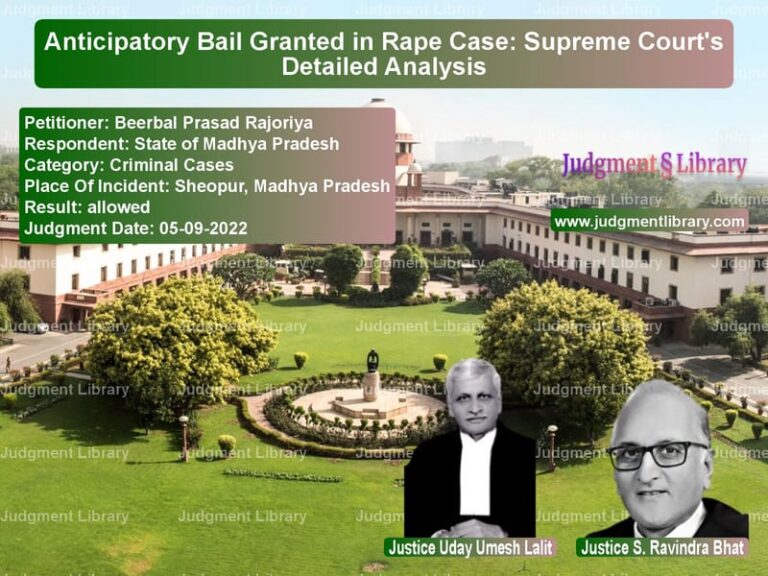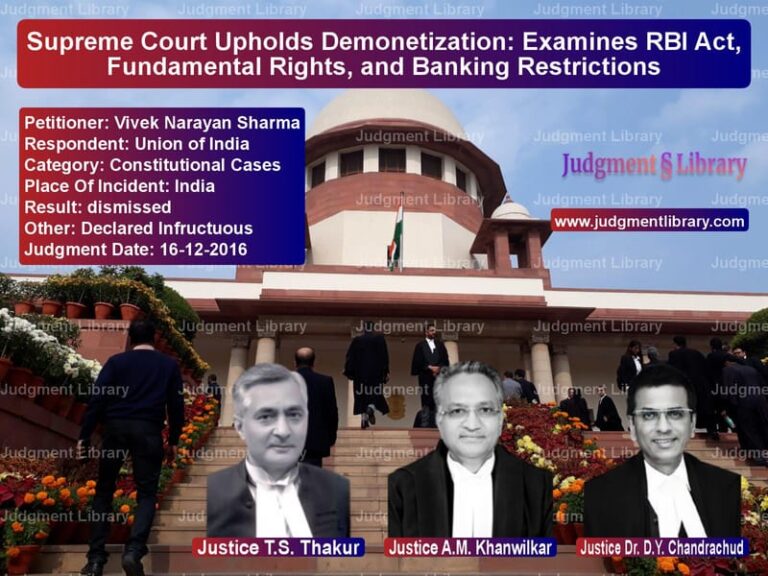Insurance Claim Denial Over Driving License Validity: Supreme Court Ruling on Employer’s Due Diligence
The case of Nirmala Kothari v. United India Insurance Co. Ltd. revolves around an insurance dispute concerning the rejection of a vehicle accident claim on the grounds that the driver’s license was unverifiable. The Supreme Court had to decide whether the insurer could deny coverage solely based on the inability to verify the driver’s license and what degree of due diligence an employer must exercise in verifying the authenticity of a driver’s license before employment.
The case originated when Nirmala Kothari, the wife of the deceased vehicle owner, filed a claim for damages and personal accident compensation under the insurance policy. The insurer, United India Insurance Co. Ltd., denied the claim, arguing that the driver’s license of Dharmendra Singh Chauhan, who was driving at the time of the accident, could not be verified. The insurer contended that this constituted a fundamental breach of the policy, absolving it of liability.
Background of the Case
The case arose from a fatal accident that took place on June 6, 2010, involving a Hyundai Elantra registered to Vinod Ray Kothari. The vehicle collided with a tractor, resulting in the deaths of Vinod Ray Kothari and his daughter. The vehicle was insured with United India Insurance Co. Ltd. for Rs. 5,00,000.
Following the accident, the driver of the vehicle, Dharmendra Singh Chauhan, reported the incident to the police and the insurer. The insurance company conducted an investigation and appointed surveyors to assess the damages. However, the insurer later repudiated the claim, stating that the driver did not hold a valid driving license. The insurer cited a report from the transport department that stated the record of the driver’s license was unavailable, leading to the conclusion that the license was invalid.
Key Legal Issues
- Whether the insurer could deny coverage based on the inability to verify the driver’s license.
- Whether the insured (employer) had exercised reasonable diligence in verifying the driver’s credentials.
- The extent of an employer’s responsibility in ensuring the validity of a driver’s license before employment.
- Whether the National Consumer Disputes Redressal Commission (NCDRC) erred in absolving the insurer of liability.
Arguments by the Petitioner (Nirmala Kothari)
Nirmala Kothari contended that:
- The driver, Dharmendra Singh Chauhan, was employed after verifying his driving license, which appeared genuine.
- It is unreasonable to expect a vehicle owner to independently verify the authenticity of a license with the Regional Transport Office (RTO) before hiring a driver.
- There was no willful negligence on the part of the insured, as the license was checked and the driver had been competently driving.
- The insurance company failed to prove that the insured was aware or had reason to believe that the license was invalid.
- The insurer wrongly denied the claim based on mere non-availability of records rather than proving that the license was fake.
Arguments by the Respondent (United India Insurance Co. Ltd.)
The insurer argued that:
- The policy conditions required that the driver possess a valid and effective driving license.
- Since the licensing authority reported that there was no record of the license in question, it must be presumed invalid.
- The insured had failed to fulfill its duty by not verifying the authenticity of the driver’s license with the RTO before hiring him.
- A fundamental breach of policy conditions occurred, absolving the insurer of liability under Section 149(2)(a)(ii) of the Motor Vehicles Act, 1988.
Supreme Court’s Observations
The Supreme Court examined the question of whether an employer is obligated to conduct independent verification of a driver’s license with the RTO before hiring a driver. The Court referred to prior judgments, including United India Insurance Co. Ltd. v. Lehru & Ors. (2003) and National Insurance Co. Ltd. v. Swaran Singh & Ors. (2004), to determine the obligations of an insured in such cases.
“The owner cannot be expected to go beyond that, to the extent of verifying the genuineness of the driving licence with the licensing authority before hiring the services of the driver.”
The Court further emphasized that an insured vehicle owner must verify the driver’s license at the time of employment, but there is no requirement to conduct an independent investigation with the RTO unless there is reasonable suspicion about the authenticity of the license.
The judgment reaffirmed that mere absence of a license record in the RTO database does not automatically absolve the insurer of liability. Instead, the insurer must prove that the insured had knowledge of the invalidity of the license and still permitted the driver to operate the vehicle.
Final Judgment
The Supreme Court ruled in favor of the petitioner, setting aside the NCDRC’s decision and holding that the insurer was liable to indemnify the insured. The key rulings were:
- There was no evidence that the insured was aware or had reason to suspect that the driver’s license was invalid.
- An employer is expected to check whether a driver has a license, but is not required to verify its authenticity with the RTO unless there is a reason to doubt its validity.
- The insurer failed to establish that the insured acted with willful negligence or in breach of the policy conditions.
- The insurance claim was valid, and the insurer was directed to compensate the petitioner.
Conclusion
This judgment reinforces the principle that insurance claims cannot be denied solely on the basis that a driver’s license could not be verified. The ruling clarifies:
- An employer’s responsibility is limited to checking if a driver has a license; independent verification with the RTO is not mandatory.
- Insurance companies must prove willful negligence by the insured to deny claims under policy conditions.
- The absence of RTO records does not automatically render a license invalid.
- Consumers are protected from unfair denial of claims based on procedural technicalities.
This judgment serves as a significant precedent in motor insurance cases, ensuring that insurers do not unreasonably reject claims by imposing an excessive burden of verification on policyholders.
Petitioner Name: Nirmala Kothari.Respondent Name: United India Insurance Co. Ltd..Judgment By: Justice Navin Sinha, Justice Krishna Murari.Place Of Incident: Rajasthan, India.Judgment Date: 04-03-2020.
Don’t miss out on the full details! Download the complete judgment in PDF format below and gain valuable insights instantly!
Download Judgment: Nirmala Kothari vs United India Insuran Supreme Court of India Judgment Dated 04-03-2020.pdf
Direct Downlaod Judgment: Direct downlaod this Judgment
See all petitions in Motor Insurance Settlements
See all petitions in Life Insurance Claims
See all petitions in Other Insurance Cases
See all petitions in Judgment by Navin Sinha
See all petitions in Judgment by Krishna Murari
See all petitions in allowed
See all petitions in Quashed
See all petitions in supreme court of India judgments March 2020
See all petitions in 2020 judgments
See all posts in Insurance Cases Category
See all allowed petitions in Insurance Cases Category
See all Dismissed petitions in Insurance Cases Category
See all partially allowed petitions in Insurance Cases Category







